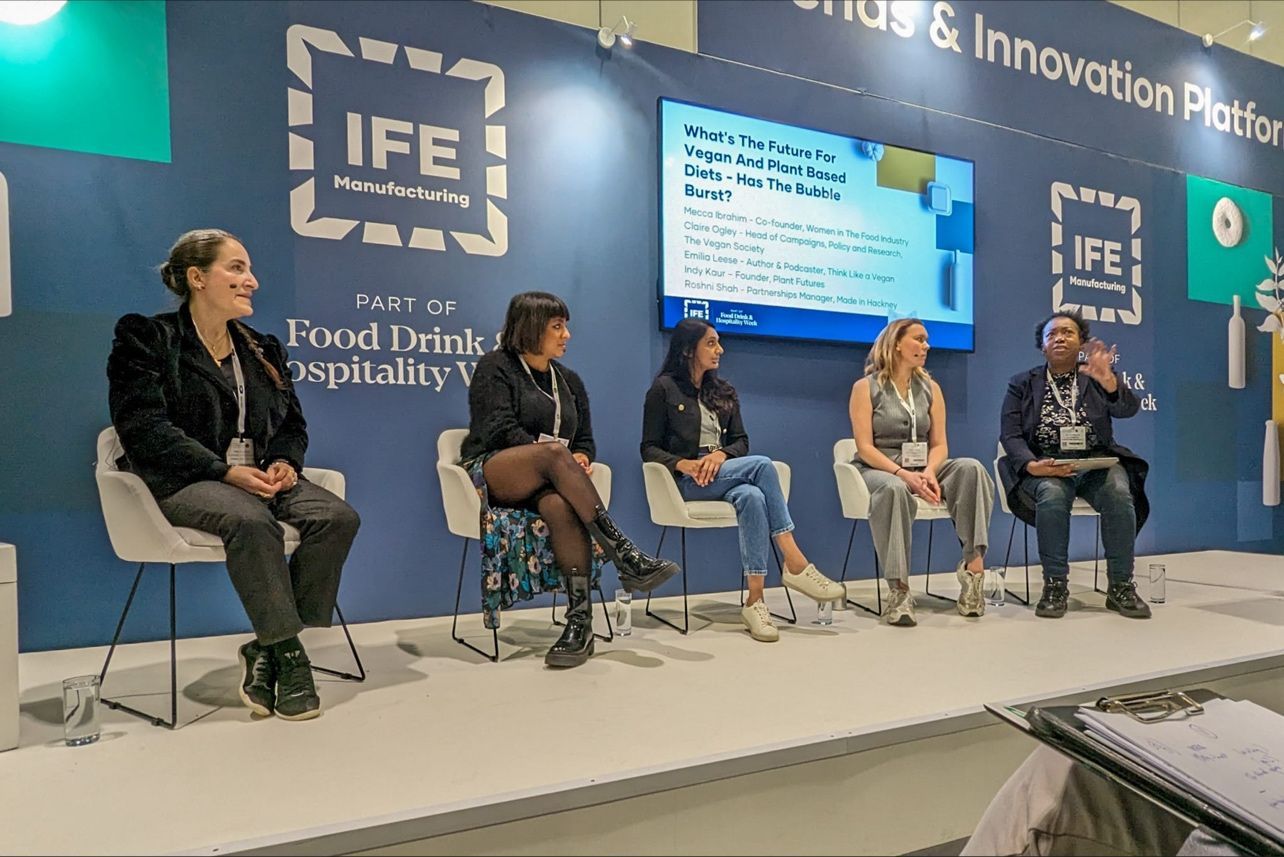Uncovering the future of vegan & plant-based at IFE Manufacturing

One of the most well-attended sessions on IFE Manufacturing’s Trends & Innovation Platform this year was entitled ‘The Future of Vegan & Plant-Based – Has the bubble burst?’, taking a look at some of the recent developments in the vegan & plant-based sector with a group of industry experts.
Chaired by Mex Ibrahim of Women in the Food Industry, the discussion featured Emilia Lees of Think Like a Vegan, Indy Kaur of Plant Futures, Claire Ogley of The Vegan Society, and Roshni Shah of Made in Hackney.
IFE Manufacturing’s PR Director Nicola Macdonald caught up with the group following the event to discuss some of the session’s major themes and talking points.
The somewhat provocative title of the session was ‘has the vegan bubble burst?’, asking if some recent high-profile liquidations of vegan brands were a sign of an industry-wide wobble or the category.
The panellists, however, argue that there’s still plenty of innovation and growth to be seen in the world of vegan & plant-based foods.
“More large food companies who may not have a traditional plant-based or vegan background (or ethics) are moving into this area, in spite of the supposed bubble bursting, as they clearly see the growth of areas like Veganuary and the fact that 50% of the UK population are buying and drinking plant-based milk,” says Mex.
“Offering people even more plant-based options in restaurants (or dropping red meat - there is evidence of this quietly taking place in a number of restaurants), in food service and in workplace hospitality will continue to grow. The use of vegan proteins such as beans, pulses and ancient grains is massively on the rise too (see Bold Bean Co's growth), but education of how to cook these proteins is key to growth in this area.”
Claire points out that all the evidence suggests that the number of vegans in the UK and slowly and sustainably growing year on year, especially among Gen Z and Millennials. Around a third of people report to The Vegan Society that they are consistently striving to reduce their meat consumption, and plant-based alternatives have a huge role to play in aiding that transition.
The idea of plant-based or vegan foods as a recent trend is incorrect, Roshni adds.
“Many dishes regularly eaten across many food cultures are already plant based,” she explains. “Dishes where veg is centred and celebrated. However, when discussing plant-based food, it is pertinent to apply a food justice perspective.
“Vegan food is better for people and planetary healthy, but many low-income communities in the UK face food apartheid and have no access to nutritious, affordable food at all. This is important as everyone has a right to access good, nutritious and healthy food and we need policies that enable this access for all.”
When it comes to the discussion around vegan & plant-based diets, Indy argues that it’s important to differentiate the two.
“The sector needs to come out of this ‘grey’ area as this may be holding back growth for veganism as well as plant based,” she says. “The consumer groups are different and likely to have different preferences and motivations.
"It’s important to discuss this topic beau case we are dealing with a polarised food sector meat vs vegan. To transition to a healthy, more sustainable food system, industry leaders to keep an open mind and recognise veganism is a part of the solution.”
Emilia adds that ethics isn’t the only reason for brands and consumers to embrace changing food habits,
“This is the one of the major shifts we can make in terms of reducing the environmental impact of our food systems whether in terms of emissions, land use, surface and water pollutants and loss of biodiversity,” she explains. “Without such a shift, a reduction in oil and gas production and consumption will be insufficient to adequately stave off the worst effects of climate change.”
Looking to the future
A central question of the panel discussion was what the future of the vegan & plant-based sector might look like.
“As with any new development or product, plant-based food and drink will have highs and lows,” says Emilia. “That this category is cemented as viable and something consumers want, is unquestionable. The plant-based food and drink sector is merely in its infancy, and I look forward to its continued development for years to come.”
Claire says that The Vegan Society is seeing more and more alternative available and competition to replace animal products such as eggs or cream.
“In previous years there has been a heavy focus on meat, dairy and fish alternatives,” she adds. “Now that these products have become part of our everyday diets (Ipsos report that 48% of British adults now use plant milk and 58% use at least one plant-based meat alternative), the categories can continue to expand into other areas.”
Indy says that fashion brands, beauty and non-food are likely to play a much bigger role in vegan than before.
“Many are already adopting vegan certifications and promoting vegan materials like ‘vegan leathers’ as well and beauty brands inc.,” she comments. “This links with the consumer demand for cruelty free, without animal testing, cosmetics.”
IFE Manufacturing 2025 takes place on 17-19 March at ExCeL London, as part of Food, Drink & Hospitality Week. Keep up to date with all the latest news, interviews and industry trends by subscribing to the IFE Manufacturing newsletter.
)
)
)
)
)
)
)
)
)
)
)
)
)
)
)
)
)
)
)
)
)
)
)
)